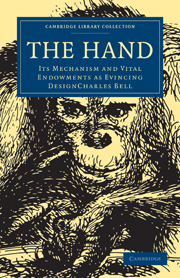Book contents
- Frontmatter
- PREFACE
- Contents
- CHAP. I INTRODUCTORY
- CHAP. II DEFINITION OF THE HAND
- CHAP. III THE COMPARATIVE ANATOMY OF THE HAND
- CHAP. IV OF THE MUSCLES OF THE ARM AND HAND
- CHAP. V THE SUBSTITUTION OF OTHER ORGANS FOR THE HAND
- CHAP. VI THE ARGUMENT PURSUED FROM THE COMPARATIVE ANATOMY
- CHAP. VII OF SENSIBILITY AND TOUCH
- CHAP. VIII OF THE SENSES GENERALLY INTRODUCTORY TO THE SENSE OF TOUCH
- CHAP. IX OF THE MUSCULAR SENSE
- CHAP. X THE HAND NOT THE SOURCE OF INGENUITY OR CONTRIVANCE, NOR CONSEQUENTLY OF MAN'S SUPERIORITY
- ADDITIONAL ILLUSTRATIONS
- APPENDIX
CHAP. IX - OF THE MUSCULAR SENSE
Published online by Cambridge University Press: 29 August 2010
- Frontmatter
- PREFACE
- Contents
- CHAP. I INTRODUCTORY
- CHAP. II DEFINITION OF THE HAND
- CHAP. III THE COMPARATIVE ANATOMY OF THE HAND
- CHAP. IV OF THE MUSCLES OF THE ARM AND HAND
- CHAP. V THE SUBSTITUTION OF OTHER ORGANS FOR THE HAND
- CHAP. VI THE ARGUMENT PURSUED FROM THE COMPARATIVE ANATOMY
- CHAP. VII OF SENSIBILITY AND TOUCH
- CHAP. VIII OF THE SENSES GENERALLY INTRODUCTORY TO THE SENSE OF TOUCH
- CHAP. IX OF THE MUSCULAR SENSE
- CHAP. X THE HAND NOT THE SOURCE OF INGENUITY OR CONTRIVANCE, NOR CONSEQUENTLY OF MAN'S SUPERIORITY
- ADDITIONAL ILLUSTRATIONS
- APPENDIX
Summary
Of the Sensibility of the Infant to Impressions, and the gradual Improvement of the Sense of Touch.
A notion prevails that the young of animals are directed by instinct, but that there is an exception in regard to the human offspring: that in the child we have to trace the gradual dawn and progressive improvement of reason. This is not quite true; we doubt whether the body would ever be exercised under the influence of reason alone, and if it were not first directed by sensibilities which are innate or instinctive.
The sensibilities and the motions of the lips and tongue are perfect from the beginning; and the dread of falling is shewn in the young infant long before it can have had experience of violence of any kind.
The hand, which is to become the instrument for perfecting the other senses and developing the endowments of the mind itself, is in the infant absolutely powerless. Pain is poetically described as that power into whose “ iron grasp” we are consigned, to be introduced to a material world ; now, although the infant is capable of an expression of pain, which cannot be misunderstood and is the same which accompanies all painful impressions during the whole life, yet it is unconscious of the part of the body which suffers. We have again recourse to the surgeon's experience.
- Type
- Chapter
- Information
- The HandIts Mechanism and Vital Endowments as Evincing Design, pp. 191 - 207Publisher: Cambridge University PressPrint publication year: 2009First published in: 1833



